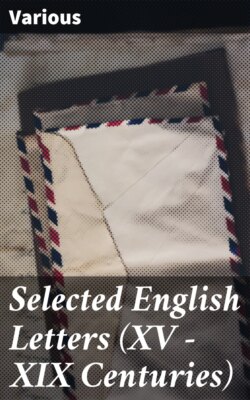Читать книгу Selected English Letters (XV - XIX Centuries) - Various - Страница 30
На сайте Литреса книга снята с продажи.
TO THE SAME.
ОглавлениеTable of Contents
Wilful woman
[No date; c. 1653.]
I was carried yesterday abroad to a dinner that was designed for mirth, but it seems one ill-humoured person in the company is enough to put all the rest out of tune, for I never saw people perform what they intended worse, and could not forbear telling them so; but to excuse themselves and silence my reproaches they all agreed to say that I spoiled their jollity by wearing the most unseasonable looks that could be put on for such an occasion. I told them I knew no remedy but leaving me behind them; that my looks were suitable to my fortune though not to a feast. Fie, I am got into my complaining humour that tires myself as well as every body else, and which (as you observe) helps not at all; would it would leave me and that I should not always have occasion for it, but that's in nobody's power, and my Lady Talmash, that says she can do whatever she will, cannot believe whatsoever she pleases. 'Tis not unpleasant, methinks, to hear her talk how at such a time she was sick, and the physicians told her she would have the small-pox and showed her where they were coming out upon her, but she bethought herself that it was not at all convenient for her to have them at that time; some business she had that required her going abroad, and so she resolved she would not be sick nor was not. Twenty such stories as these she tells, and then falls into discourses of the strength of reason and power of philosophy till she confounds herself and all that hear her. You have no such ladies in Ireland. … My poor Lady Vavasor is carried to the Tower, and her situation could not excuse her, because she was acquainted by somebody that there was a plot against the Protector, and did not discover it. She has told now all that was told her, but vows she will never say from whence she had it; we shall see whether her resolutions are as unalterable as those of my Lady Talmash. I wonder how she behaved herself when she was married; I never yet saw anybody that did not look simply and out of countenance, nor ever knew a wedding well designed but one, and that was of two persons who had time enough I confess to contrive it, and nobody to please in it but themselves. He came down into the country where she was upon a visit, and one morning married her; as soon as they came out of the church, they took coach and came for the town, dined at an Inn by the way, and at night came into lodgings that were provided for them, where nobody knew them, and where they passed for married people of seven years' standing. The truth is I could not endure to be Mrs. Bride in a public wedding, to be made the happiest person on earth; do not take it ill, for I would endure it if I could, rather than fail, but in earnest I do not think it were possible for me; you cannot apprehend the formalities of a treaty more than I do, nor so much the success of it. Yet in earnest your father will not find my brother Peyton wanting in civility (though he is not a man of much compliment unless it be in his letters to me), nor an unreasonable person in any thing so he will allow him, out of his kindness to his wife, to set a higher value upon his sister than she deserves. I know not how he may be prejudiced upon the business, but he is not deaf to reason when it is civilly delivered, and is as easily gained with compliance and good usage as any body I know, but no other way; when he is roughly used he is like me ten times the worse for it. I make it a case of conscience to discover my faults to you as fast as I know them, that you may consider what you have to do: my aunt told me no longer ago than yesterday, that I was the most wilful woman that ever she knew, and had an obstinacy of spirit nothing could overcome. Take heed, you see I give you fair warning. I have missed a letter this Monday, what is the reason? By the next I shall be gone into Kent, and my other journey is laid aside, which I am not displeased at, because it would have broken our intercourse very much. Here are some verses of Cowley's; pray tell me how you like them. It is only a piece taken out of a new thing of his. The whole is very long, and is a description of, or rather a paraphrase upon, the friendships of David and Jonathan. 'Tis I think the best I have seen of his, and I like the subject because it is that I would be perfect in. Adieu!
